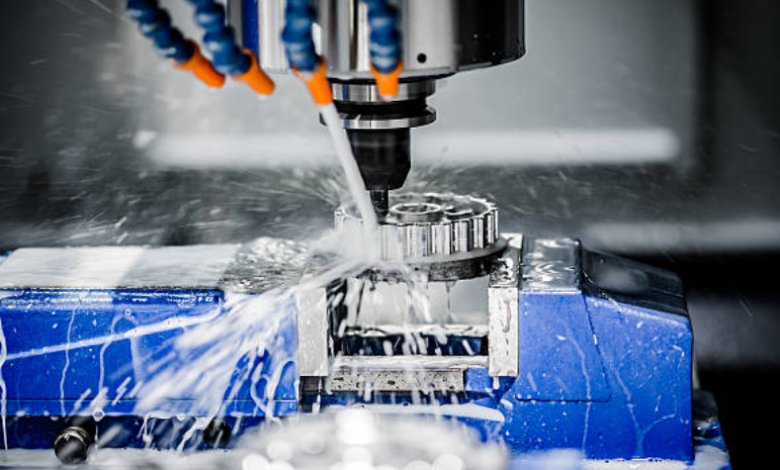Selecting CNC Machining Materials for Efficient Manufacturing

Introduction to CNC Machining
CNC machining has transformed modern manufacturing by providing high precision and repeatability. It allows manufacturers to produce complex parts with accuracy and consistency, which is crucial for industries such as aerospace, automotive, electronics, and medical devices. One of the key factors that influence the success of CNC machining is the choice of materials. Selecting the appropriate cnc machining materials ensures that components are durable, reliable, and suitable for their intended applications.
Overview of CNC Machining Materials
CNC machining materials are generally categorized into three main types: metals, plastics, and composites. Each type has its distinct characteristics, advantages, and limitations, which determine its suitability for different projects.
Metals
Metals are widely used in CNC machining due to their strength, durability, and ability to withstand high stress. Common metals include:
- Aluminum: Lightweight, corrosion-resistant, and easy to machine. Aluminum is used in aerospace components, automotive parts, and electronic enclosures.
- Stainless Steel: Strong, corrosion-resistant, and suitable for medical instruments, food processing equipment, and structural parts.
- Brass: Offers good corrosion resistance and machinability, making it ideal for fittings, decorative pieces, and electrical components.
- Titanium: Extremely strong yet lightweight, often used in aerospace, medical implants, and high-performance automotive components.
Plastics
Plastic materials are used when weight reduction, chemical resistance, or electrical insulation is required. Common examples include:
- Acrylic: Transparent and easy to machine, suitable for signage, displays, and protective covers.
- Nylon: Strong and wear-resistant, often used in mechanical parts such as gears and bushings.
- Polycarbonate: Impact-resistant and ideal for electronic housings, lenses, and safety equipment.
- Acetal (Delrin): Dimensional stability and low friction make it suitable for precision mechanical components.
Composite Materials
Composite cnc machining materials combine two or more materials to achieve superior properties, such as higher strength-to-weight ratio or enhanced durability. Carbon fiber reinforced plastics and fiberglass are widely used in aerospace, automotive, and sporting equipment.
Factors to Consider When Choosing Materials
Choosing the right cnc machining materials requires evaluating several critical factors. These factors ensure that the final product meets performance requirements and manufacturing efficiency.
Mechanical Properties
The strength, hardness, toughness, and flexibility of a material are essential considerations. Metals like stainless steel and titanium provide excellent strength, whereas plastics such as nylon offer flexibility and impact resistance.
Machinability
Machinability determines how easily a material can be shaped and finished. Materials that are easy to machine, like aluminum and brass, reduce tool wear and production time. Harder metals may require specialized cutting tools and slower machining speeds.
Thermal and Chemical Resistance
Materials exposed to high temperatures or harsh chemicals must maintain structural integrity. Stainless steel and polycarbonate are preferred for their resistance to heat and chemical corrosion.
Cost and Availability
Budget constraints often influence material selection. While high-performance metals like titanium provide excellent properties CNC machining materials their cost may be prohibitive. Balancing material cost with performance is crucial for efficient manufacturing.
See also: How Active Release Techniques Work to Relieve Pain and Improve Mobility
Benefits of Using Appropriate Materials
Selecting high-quality cnc machining materials offers several advantages:
- Precision: Consistent material properties reduce deformation and allow for tighter tolerances.
- Durability: Strong and wear-resistant materials increase component lifespan.
- Versatility: Materials with favorable properties allow the creation of complex designs.
- Cost Efficiency: High-quality materials may reduce tool wear, machining time, and maintenance, providing long-term savings.
Industrial Applications
CNC machining materials are essential across multiple industries, each requiring specific material characteristics.
Aerospace Applications
Lightweight metals such as aluminum and titanium are preferred for aircraft parts due to their excellent strength-to-weight ratios. Components such as frames, engine parts, and landing gear benefit from these materials.
Automotive Industry
Metals and high-performance plastics are used for engine components, transmissions, and interior parts. Strength, durability, and thermal resistance are key considerations in material selection.
Medical Devices
Biocompatible metals like titanium and stainless steel are commonly used for implants, surgical instruments, and prosthetics. Plastics like polycarbonate and acetal provide durability and chemical resistance for medical devices.
Electronics and Technology
Lightweight metals and plastics are widely used for housings, connectors, and heat sinks. Materials with good electrical insulation and thermal conductivity properties are preferred in electronic applications.
Future Trends in CNC Machining Materials
The demand for advanced materials continues to rise as technology progresses:
- Advanced Alloys: Development of alloys with higher strength and corrosion resistance.
- Reinforced Composites: Increased use of carbon fiber and fiberglass for lightweight and durable components.
- Eco-friendly Plastics: Growing focus on sustainable plastics to reduce environmental impact.
- Smart Materials: Materials that respond to environmental conditions, such as temperature or stress, enhancing component performance.
Conclusion
Selecting the right cnc machining materials is critical for producing high-quality, durable, and cost-effective components. Metals, plastics, and composites each offer unique benefits and are suitable for specific applications. Understanding material properties and industry requirements enables manufacturers to optimize production and achieve superior results. With continuous advancements in material science, CNC machining remains a versatile and essential technology for modern manufacturing.




